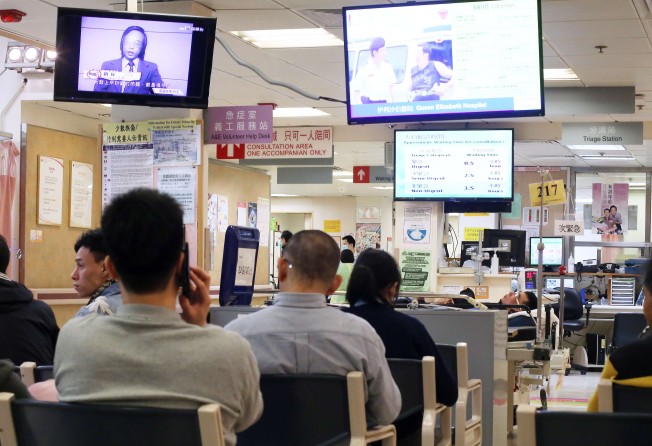Letters to the Editor, March 6, 2017

Time to deal with public hospital delays
Your correspondent Kay Chong Soy, an “octogenarian”, explained that she had been given an appointment that was 14 months away to see a Hospital Authority specialist doctor (“Long wait to see specialist at public hospital”, March 4).
Every influential person in Hong Kong should read that letter and, more importantly, follow up.
It is well known that waits of this length are the norm, and in many different specialties.
In my experience of dealing with elderly Comprehensive Social Security Assistance recipients, their greatest anxiety was to do with whether they would receive timely treatment at Hospital Authority facilities, even more than over their cash incomes.
Hong Kong has the potential to develop an excellent public health service: it has the quality staff and facilities but needs to greatly increase the quantity. Sticking-plaster solutions in terms of vouchers for visits to private doctors will not achieve this.
An ambitious programme to bring our medical services up to scratch would do wonders for the well-being and happiness of our community.
Rachel Cartland, Mid-Levels
Stores should cut back on packaging
The story about supermarket City’super selling an individually packaged strawberry, focused attention on the problems of excessive packaging in Hong Kong (“Hong Kong supermarket selling strawberries individually wrapped for HK$168 as pressure grows to reduce packaging”, February 8). Despite the criticism, large supermarkets like this one continue to use a lot of packaging when displaying fruit.
Some customers actually prefer this packaging policy, but even if there is not a strong public backlash, these companies should be practising corporate social responsibility.
Shoppers should at least be provided with options so that they can purchase the fruit they want without it being wrapped in plastic packaging.
The stores might argue that fruit is covered in plastic to protect it, but fruit with hard skins, such as pomegranates, does not bruise easily, so it is unnecessary.
Customers should be urged to make wiser choices when shopping, because needless packaging damages the environment.
Annie Wong, Taikoo Shing
Trucks do not offer genuine HK street food
The government hopes that the food truck pilot scheme it launched will appeal to tourists and offer a variety of high-quality food to the public. However, I am not convinced that the scheme will benefit Hong Kong.
I think the trucks pose a threat to traditional local street food culture. The government has not been issuing new hawker licences and so their numbers have dwindled. Those that are left could find themselves pushed out by food trucks.
Some of the trucks do sell food associated with Hong Kong, such as pineapple buns and big chicken buns, but most of them offer a fusion of Eastern and Western flavours and this is not really representative of local cuisine. Therefore, the tourists who eat at these trucks are not experiencing the traditional street food culture, represented by the hawkers, that has been with us for generations.
I also have doubts about the viability of the scheme, as it costs a lot to get a food truck business up and running in Hong Kong.
I expect this will mean that operators will have to charge quite a lot if they hope to make a profit. If they cannot get enough customers, as they are put off by high prices, I wonder if these trucks will make a profit.
Jessie Leung Cheuk-yau, Yau Yat Chuen
Education key to citizens taking up sport
The government has in recent years enhanced the city’s sports infrastructure. It aims to get more citizens involved in sport, but has it worked?
For example, Tseung Kwan O has five sports centres and one sports ground, but do they lead to more people exercising?
These facilities are of little use if overall attitudes remain unchanged. The government must better publicise the benefits of regular exercise and then hopefully more people will use these sports centres.
Christy Lam, Po Lam
Independence calls unwise in ‘one country’
The debate about whether Hong Kong should be independent continues, with political leaders here and in Beijing openly condemning it (“Premier Li Keqiang sounds warning on Hong Kong independence”, March 5).
I largely agree with the views they have expressed, because I see Hong Kong as a part of China.
Of course it was a colony, but its return to China in 1997 was an irreversible act. Some Hongkongers see themselves as being different from other Chinese because of the city’s unique Western influence.
I accept that cultural differences exist, but, at the end of the day, Hong Kong and mainland citizens are part of the same nation.
Hong Kong is an international financial centre, but that does not mean that it could be a separate country.
Even though the Hong Kong government can run the city, we still rely on help from the central government. For example, we enjoy the protection of the military and Beijing is responsible for foreign affairs.
Both sides prosper from this cooperation between the mainland and Hong Kong.
It is unwise for people to keep calling for independence.
Ivan Ip, Tseung Kwan O
CCTV in taxis can make drivers behave
I do not use taxis that often as I find them expensive. Overall I think our taxi services are satisfactory, but I have had some unpleasant experiences.
Last month, I was in a hurry to get to an exam and some of the drivers I approached were rude and refused the hire because they were about to have lunch.
The initiative of installing closed-circuit TVs and a rating device in some taxis could lead to improved standards. Drivers might then think twice about being rude to a passenger .
The ratings gadget lets passengers say what they think about the service, but it can only work if the taxi operators take note of this feedback.
Jessica Leong, Yau Yat Chuen